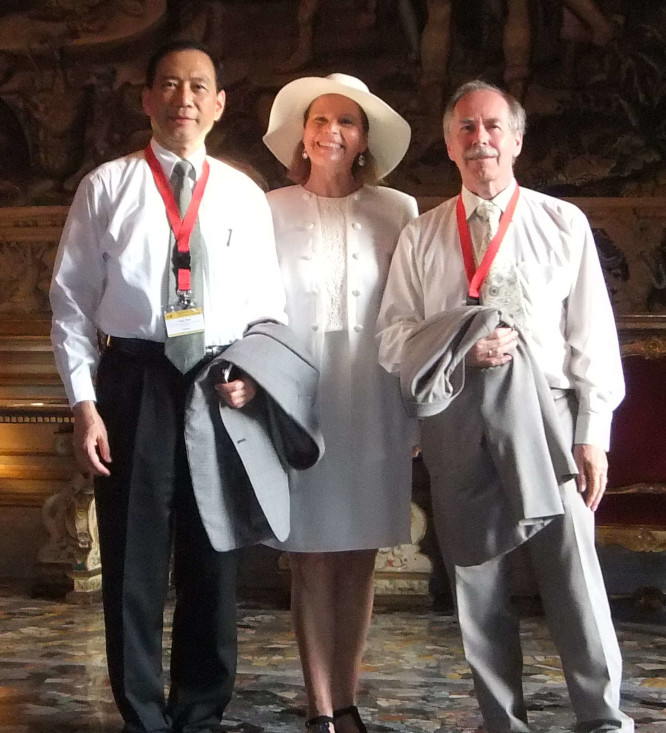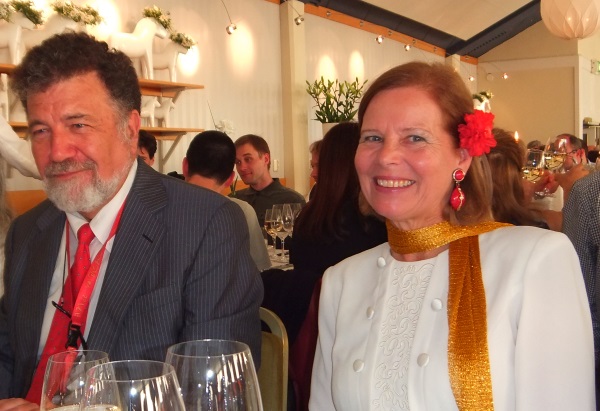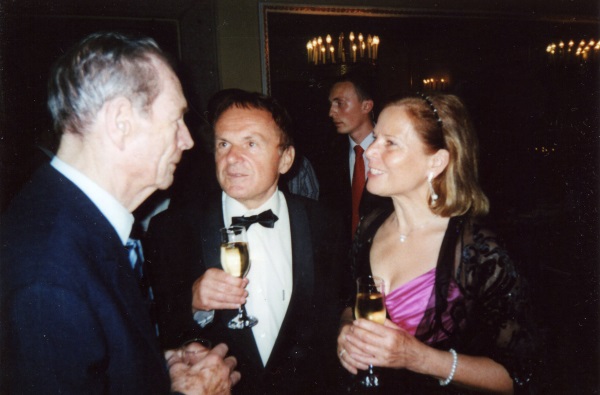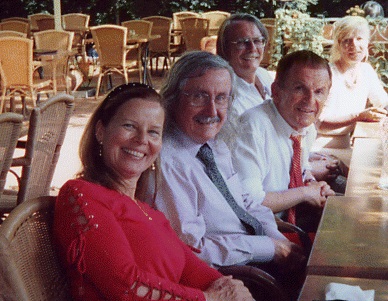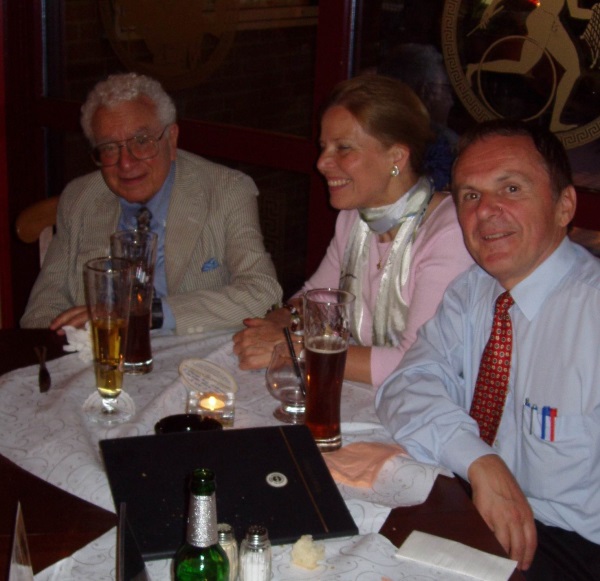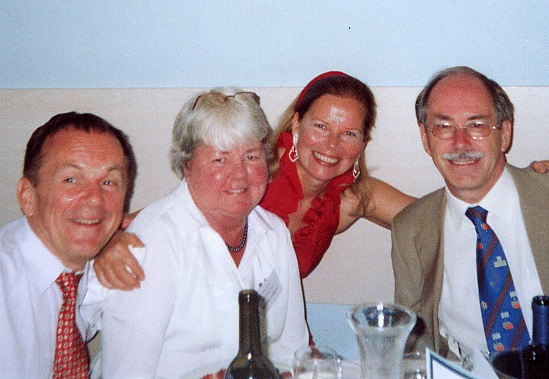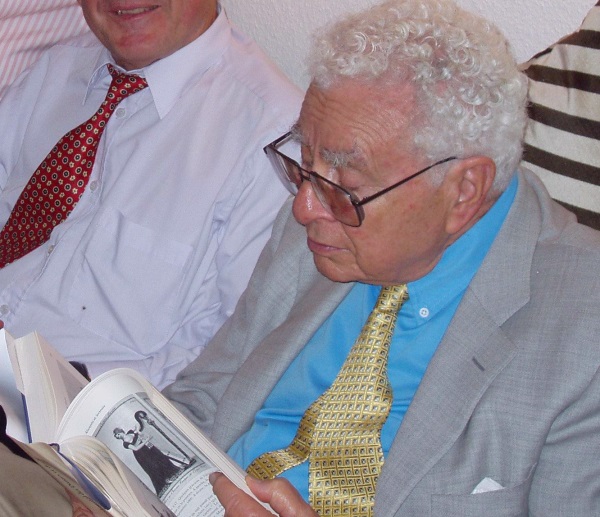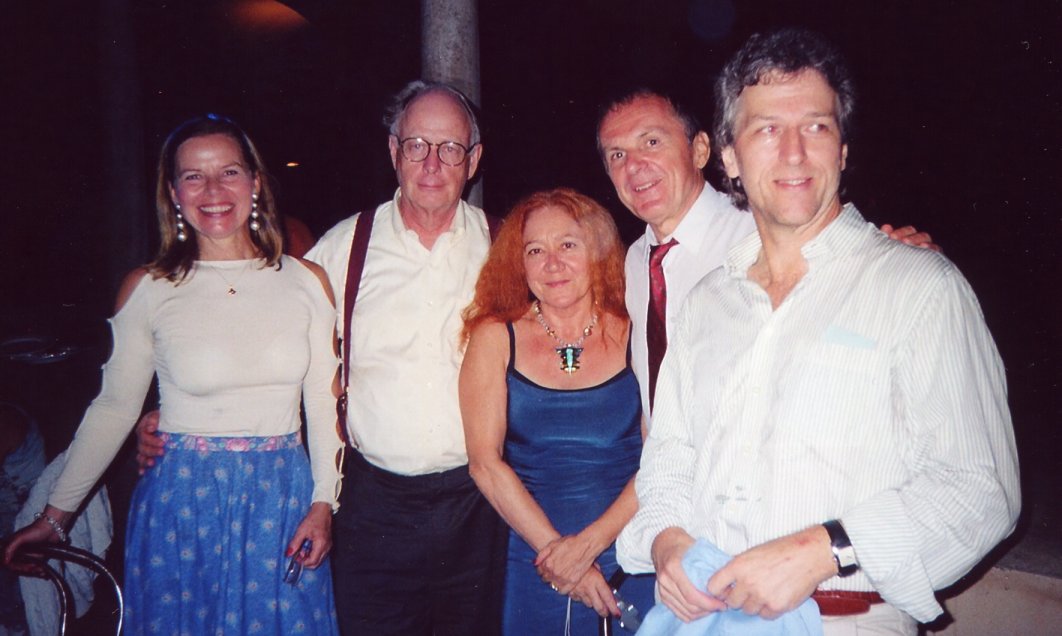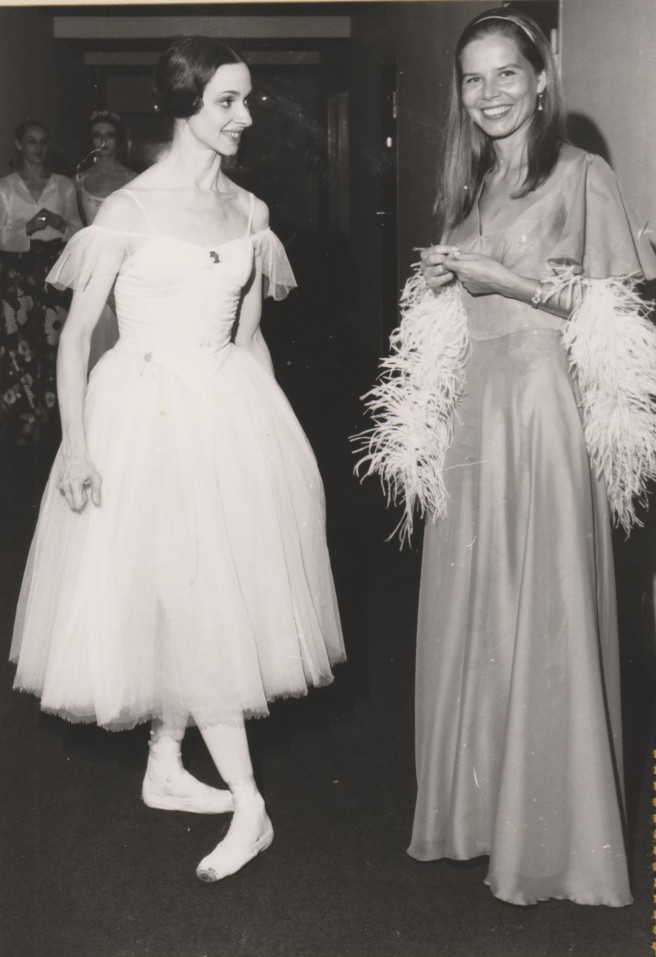
Annemarie Kleinert
I was born in Westphalia, as the first of three sisters.
After an education in Münster, I specialized in French History.
During semester breaks I worked temporarily at Geneva at the international center CERN.
There, I met my later husband Hagen Kleinert
who was a professor of physics in Berlin. In 1970 we moved in together, and I started my Ph.D.
studies at the Free University Berlin. For several years I was involved in research projects
financed by the German Science Foundation (DFG). We married in 1974, and I got my doctor-degree
in 1976. In between we spent several times half a sabbatical year at American universities,
such as Pasadena, Berkeley, Santa Barbara, San Diego, and Miami.
In 1989 I had my son
Michael Kleinert.
Since then I work as an independent author in the field of cultural history.
The results of my work were presented in books, journals, and lectures.
My most important research dealt with the history of the French feminine press.
In that field I published many articles, and two pioneering books. In one of them
I discovered that
Honoré de
Balzac
anonymously worked for the
Journal des Dames et des Modes before he started his career as a writer
of novels. This was unknown before.
A popular book I wrote was the biography on
Eva Evdokimova,
prima ballerina, especially dancing in the 1970s and 1980s all over the world,
often with
Rudolf Nureyev.
For the 40th anniversary of the Free University Berlin, I was commissioned to write
a documentary on the post-revolutionary years 1969 to 1973.
Another popular book I wrote was the one on the
Berlin Philharmonic
Orchestra,
starting with the period of its most famous conductor Herbert von Karajan.
It was published in German, and translated to English and Japanese.
Life
| Born: | February 1st, 1947 |
| Deceased: | March 2nd, 2021 |
| Nationality: | German |
| Parents: | Hedwig and Ferdinand Ludwig |
Education
| High School: | Annette-von-Droste-Huelshoff-Gymnasium, Münster |
| Further education: | French Literature, History, Philosophy, Geography, Textile Design, Pedagogics. |
| 1966 - 1968: | University of Muenster |
| 1968 - 1969: | University of Grenoble |
| 1969 - 1972: | University of Berlin |
| 1972: | Staatsexamen für das Lehramt an Gymnasien |
| 1972 - 1976: | Free University of Berlin |
| 1976: | Doctor of Philosophy |
Professional Activities
| 1969 - 1972: | Various part time jobs as a student at the international organisation of CERN in Geneva |
| 1975 - 1976: | Research Fellow at the Free University of Berlin |
| 1976 - 1981: | Research Fellow at the University of Hannover |
| 1982 - 1984: | Various visits of universities in the USA, lectures given at Caltech in Pasadena, at the Univ. of California at Santa Barbara, at the University of Hawaii. Lectures given in Paris, Lyon and Italy. |
| 1985: | Research Fellow at the Free University of Berlin |
| 1985 - 1986: | Visiting Lecturer at the University of California at San Diego |
| 1987: | Research Fellow at the Free University of Berlin |
| Since 1987: | Lectures presented at various institutions: Paris (Sorbonne, Institut Historique Allemand), Bielefeld (Zentrum fuer Interdisziplinaere Forschung), Frankfort (Historisches Museum), Florence (University), Jena (University), La Flèche, Ann Arbour (University). Publication of articles in dictionaries and historical journals. Contribution to the catalogue of an exhibition, broadcast interviews, book reviews. Work in archives and libraries. |
| 2006: | Organization of a big scientific conference ( MG11 ) in Berlin. |
picture gallery
Books

Music at its Best: The Berlin Philharmonic
The Berlin Philharmonic is a synonym for excellent musical enjoyment. During the last fifty years it has gone from success to success with its illustrious conductors Herbert von Karajan, Claudio Abbado, and Sir Simon Rattle. Dr. Annemarie Kleinert relates the history of this period. Knowledgeable and entertainingly, she presents the development and the internal organization of the orchestra, its collaboration with renowned guest conductors, soloists, and composers, as well as its many voyages. This is a factual yet also engaging book that includes personal observations of musicians and conductors along with numerous photographs mostly taken by one of the members of this musical ensemble.
Revised and translated from the German book into English by Annemarie Kleinert and Allan Mitchell.
bod.de, amazon.de, amazon.co.uk, amazon.com.
Open Access Download:

Berliner Philharmoniker
German original of the above book entitled "Music at its Best: The Berlin Philharmonic".
Open Access Download:

ベルリン・フィル
Revised and translated into Japanese. Translator Hideaki Mogami. With footnotes printed!
Open Access Download:
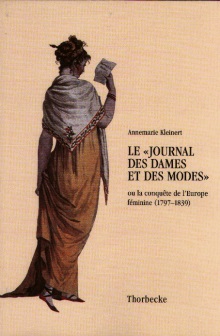
Le Journal des Dames et des Modes
The book describes the history of one of the first feminine journals in France. The magazine lastet 42 years, and was widely spread. A critic compared its influence to the one of Napoleon because the periodical's conquests were valued higher than the one of the emperor, lasting longer than his reign. The journal's copperplate engravings were copied everywhere in the civilized world. They originated from talented designers (i.e. Horace Vernet and Paul Gavarni). It is very probable that one of his journalists was the early Honoré de Balzac, a discovery which gives new insights into the Balzac-research.
Open Access Download:

Freie Universität Berlin. 1948 - 1973. Hochschule im Umbruch.
Compiled and documented by Annemarie Kleinert, Peter Jahn and Jochen Staadt.
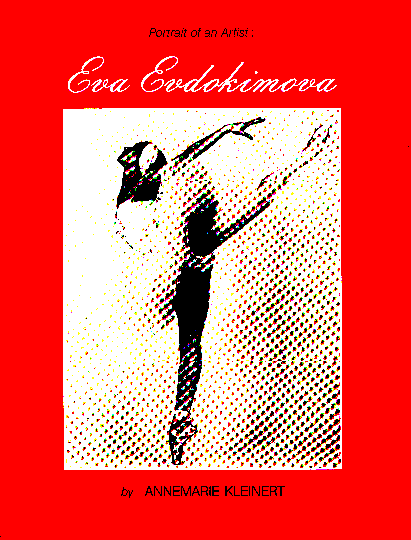
Portrait of an Artist: Eva Evdokimova
Eva Evdokimova is doubtless one of the greatest ballerinas of the 20th century. The book describes the dancer's life, assesses her art, and supplies numerous illustrations of key moments in her career. It studies training at ballet schools in Munich and London, her apprenticeship in the corps de ballet in Copenhagen, her rise from soloist to prima ballerina at the Berlin opera, her maturation with the London Festival Ballet, and finally her stardom in many guest performances all over the world. Special attention is payed to her winning competitions in Moscow and Varna, and her being with the Kirov Ballet in Leningrad. It also analyses her interpretations of Giselle and Swan Lake. Interviews with some of her fellow dancers, such as Peter Breuer, who shared the stage with her in Coppelia and Romeo and Juliet, provide further insight into her art.
Open Access Download:

Porträt einer Künstlerin: Eva Evdokimova
German original of the above book entitled "Portrait of an Artist: Eva Evdokimova".
Open Access Download:
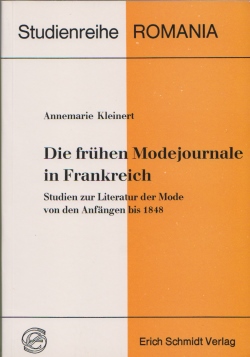
Die frühen Modejournale in Frankreich
This book is a pioneering study of the important sector of the French press, the fashion magazines. It describes how this sector evolved, and the first fifty years of its existence. Exemplarily magazines are investigated as far as their content and style is concerned. One of the key aspects is the connection between politics and these magazines, and also the importance of french famous writers, painters, and engravers for these journals. The book sketches the development of these periodicals from an elitist to a popular press.
With a bibliography of the journals until 1926.
Open Access Download:
Articles in Journals
- Ein Modejournal des 19. Jahrhunderts und seine Leserin: La Corbeille und Madame Bovary, Romanische Forschungen (IV, 1978), 458 - 477.
- Die Auflagen französischer Modezeitschriften aus der Zeit der Juli-Monarchie (1830 - 1848), Publizistik (I, 1979), 84 - 106.
- La Dernière Mode : une tentative de Mallarmé dans la presse féminine, Lendemains (XVII/XVIII, 1980), 167 - 178.
- Französische Modefotografie im 19. Jahrhundert, Lendemains (XXIII, 1981), 21 - 51.
- Vorsicht Literatur! Eine literarische Lektion vom gefährlichen Lesen, Germanisch-Romanische Monatsschrift (I, 1983), 94 - 100.
- Die reale Entsprechung des 'petit journal' in Balzacs Illusions perdues, Lendemains (XLIII/XLIV, 1986), 70 - 90.
- Balzac - erst Journalist, dann Schriftsteller. Die Jugendjahre von 1819 bis 1822, Publizistik (II, 1987), 206 - 224.
- Die heimlichen Publikationen des jungen Balzac, Lendemains (XLVII, 1987), 90 - 104.
- Balzac et la presse de son temps: ses Oeuvres et son activité vues par le Journal des Dames et des Modes (1827-- 1837), L'Année Balzacienne (1988), 367 - 393.
- La Révolution et le premier journal illustré paru en France (1785 à 1793), Dix-huitième Siècle (1989), 285 - 309.
- Mode und Politik. Die Vermarktung der französischen Revolution in Frankreich und Deutschland, Waffen- und Kostümkunde (1989), 24 - 38.
- Zwei Zeitschriften mit dem gleichen Titel: das Pariser und das Frankfurter Journal des Dames et des Modes, Publizistik (II, 1990), 209 - 222.
- L'Histoire du Journal de Berlin (1740/41), magazine politique et culturel, Studies on Voltaire and the Eighteenth Century (1991), 225 - 233.
- Original oder Kopie? Das Journal des Dames et des Modes und seine zahlreichen Varianten, Francia (20/2, 1993), 99 - 120.
- Du 'Journal des Dames et des Modes' au petit journal d'Illusions perdues, L'Année Balzacienne 1995, 267-280.
- Un Prêtre fléchois devenu auteur, éditeur et journaliste: Pierre La Mésangère (1761-1831), Cahier Fléchois 1998, 28 - 53.
- Les Débuts de Gavarni, peintre des moeurs et des modes parisiennes, Gazette des Beaux-Arts 141, November 1999, 213 - 224.
- Ein Verleger, Literat und Journalist des 19. Jahrhunderts: Pierre de La Mésangère", to be published.
- L'équipe d'artistes de l'éditeur de planches de mode Pierre de La Mésangère, to be published.
- Höhepunkte des Ballets in der Deutschen Oper, tip (II, 1979), 31.
- Nanu? Gibt es den Tanzliebling gleich doppelt?, Berliner Zeitung (April 18th, 1985), 4.
- Inside - Outside. Das 'American Dance Theatre' in Berlin, tip (XIII, 1985), 22 - 23.
- Berliner Profile. Jan Broeckx: Schwan im Korb", mit Sabine Wucyna, tip (XVI, 1985), 74-75.
Articles in Books
-
La Naissance d'une presse de mode à la veille de la Révolutionet l'essor du
genre
au XIXème siècle,
LE JOURNALISME D'ANCIEN REGIME, (P. Rétat ed.), Lyon: Presses Universitaires, Centre d'Etudes du XVIIIème siècle 1982, 189 - 197. -
La Mode - Miroir de la Révolution française,
MODES & REVOLUTION. 1780 - 1804. catalogue: Musée du Palais Galliéra, Paris, February - May 1989, 59 - 81; with different illustrations also in Francia (16/2, 1989), 75 - 98. -
Les Manifestations vestimentaires de la Révolution française étudiées
par la presse féminine,
L'IMAGE DE LA REVOLUTION FRANCAISE. Contribution to an international congress at the Sorbonne, Paris, Oxford, New York: Pergamon Press, Bd. I, 1989, 287 - 296. -
Journal de Berlin (1740/41),
DICTIONNAIRE DES JOURNAUX (1600 - 1789), Ed. Jean Sgard, Paris: Universitas, 1991, 635 - 638. -
"Frauenzeitschriften / Modezeitschriften" and "Perücke / Zopf",
LEXIKON DER AUFKLÄRUNG, München: C. Beck, 1996, 129 - 130 and 300 - 302. Second improved edition: 2001, -
Wie Balzac zum Modeexperten wurde,
MODE, WEIBLICHKEIT UND MODERNITÄT, Dortmund: edition ebersbach, 1998; 47 - 61. -
Moda ed emancipazione femminile: il modello del 'Journal des Dames et des Modes',
DONNE E GIORNALISMO. PERCORSI E PRESENZE DI UNA STORIA DI GENERE
(Ed. Silvia Franchini/Simonetta Soldani, Milano: Franco Angeli 2004), p 39-50; -
Die französischsprachige Konkurrenz des 'Journal des Luxus und der Moden',
DAS JOURNAL DES LUXUS UND DER MODEN: KULTUR UM 1800 (Eds. Angela Borchert/Ralf Dressel) [Ereignis-Weimar Jena. Ästhetische Forschungen, hrsg. v. Klaus Manger, Bd. 8],
Heidelberg: Universitätsverlag Winter 2004, S. 195-215; -
Gravures de mode et périodiques anciens: Leur rôle pour les dentelles,
Catalogue: DENTELLES: QUAND LA MODE NE TIENT QU'À UN FIL
Musée de Normandie, Caen, France, 2012: Somogy éditions d'arts, Paris, p 88-99
Lectures
-
Les Dangers de la lecture. Une interprétation historique de textes littéraires
du moyen âge au temps présent,
Institut Historique Allemand, Paris (May 1980). -
Zur Geschichte der Modeliteratur. Eine historische Studie,
University of Hanover (Oktober 1980); German-American Club, Berlin (June 1983). -
La Naissance d'une presse de mode à la veille de la Révolution,
University of Lyon (June 1981). -
Das Ballett an der Deutschen Oper Berlin,
Freie Universität Berlin (February 1982). -
The Evolution of an Art : Photography,
Centro di Cultura, Erice, Italy (August 1982). -
Women's Magazines in 18th & 19th Century Europe,
Independent Scholars, San Diego (January 1986); University of California at San Diego (March 1986). -
Gebrauchsanleitung für bürgerliches Wohlverhalten: Die Frauenzeitschriften des 19.
Jahrhunderts,
Zentrum für interdisziplinäre Forschung, Bielefeld (February 1987). -
Balzac inconnu: d'abord journaliste, puis écrivain. Les premières
années de sa carrière et son interaction avec la presse de
l'époque (1819 à 1822),
Institut Historique Allemand, Paris (April 1987). -
Les Manifestations vestimentaires de la Révolution française,
Sorbonne, Paris (July 1989). -
Die französische Revolution in französischen Frauenzeitschriften,
University of Frankfurt (November 1989). -
Il 'Journal des Dames et des Modes' ed il suo contributo all'emancipazione
femminile,
University of Florence (March 2000). -
Die französischsprachige Konkurrenz des 'Journal des Luxus und der Moden',
University of Jena (June 2000). -
Von Karajan bis Rattle,
Hoch-Rhein-Gesellschaft der Freunde der Berliner Philharmonie (February 2008). -
'Journal des Dames et des Modes',
University of Michigan, Ann Arbor (April 2009). -
'La Mésangère', propagateur de la mode parisienne,
Prytanée, La Flèche (July 2009). -
Die Berliner Philharmoniker,
Urania, Berlin (March 2010).
contact
Dr. Annemarie Kleinert
c/o Dr. Michael Kleinert
Liebensteinstr. 6
14195 Berlin
GERMANY
privacy policy
The protection of your privacy and your personal data is one of our highest priorities.
Responsible contact for any questions regarding our privacy policy:
Michael Kleinert, Liebensteinstr. 6, 14195 Berlin, GERMANY
When you access this website through your web browser, the data of your specific request is submitted to our systems. The data contains the requested web page, the type of your web browser, your computer's operating system, the hostname of your internet service provider, and your current internet protocol address (IP address). The data itself does not allow a direct reconstruction of who you are. However, collecting the data is technically required to deliver the content of the page you requested to you. This is how the internet works. Since the protection of your privacy is one of our highest priorities, your data is not stored in a permanent way on our systems. All your data is deleted after delivering the requested content to you. Since the data is not stored on a hard disk, and just kept in our system's memory for the short time of your request, it becomes unlikely that, e.g., in the worst case of a successful cyber attack, your data may be compromised.
Transport encryptionAll the data exchanged between your web browser and our systems is protected by modern encryption technologies (TLS).
When is your data deleted?We collect data that is necessary to process your request and deliver the content to your web browser. The data is deleted immediately after the connection between your web browser and our systems is closed.
Your rights of informationYou have the rights to be informed about all your data that is stored on our systems. Furthermore, you have the rights that we change or delete your data upon your request.
Changes to our privacy policyThis privacy policy may be changed in the future to always fulfill the laws. In any case, for each request of our website the currently valid privacy policy may be found on this page.

